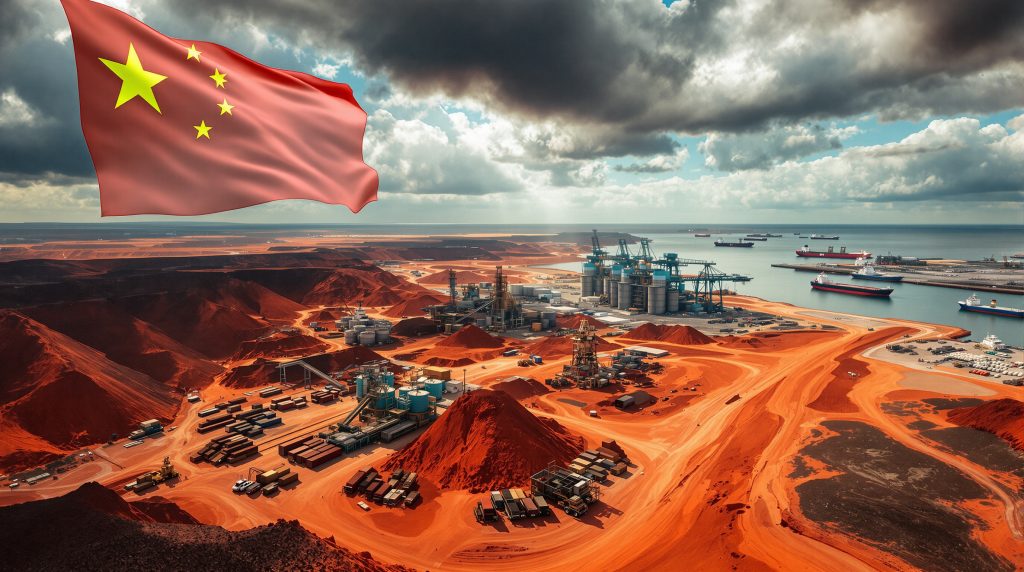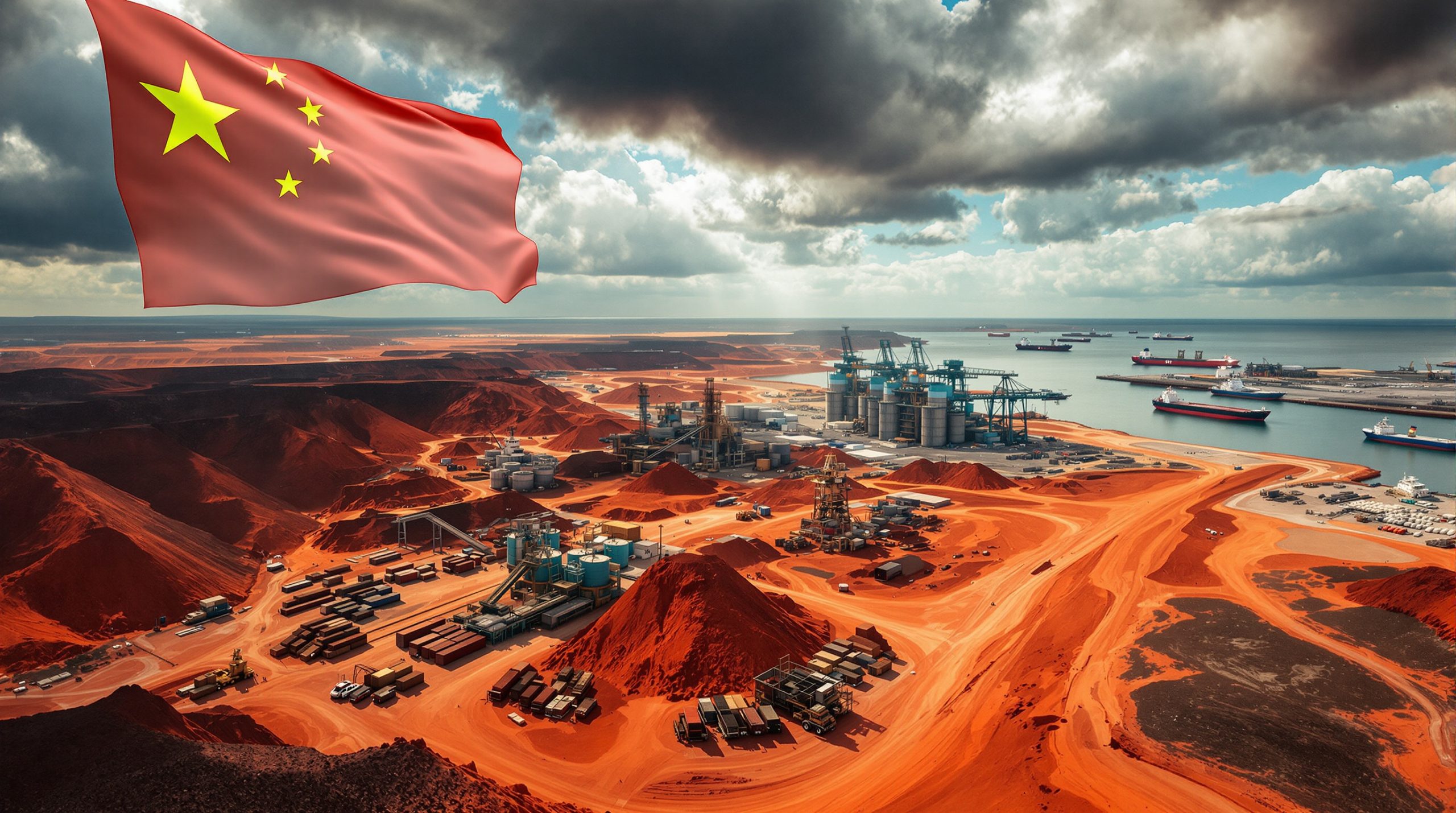What is Behind China's Iron Ore Boycott?
The Boycott Mechanism and Scope
China has implemented what appears to be an expanding boycott against BHP Group's iron ore products. Initially targeting BHP's Jimblebar blend fines, reports indicate the directive has widened to encompass all BHP iron ore shipments to China. The boycott operates through China Mineral Resources Group (CMRG), a state-established iron ore trading entity formed in 2022, which has instructed Chinese steel mills to halt purchases.
The Contract Pricing Dispute
At the heart of this trade action lies a significant pricing disagreement between China and BHP following unsuccessful negotiations over long-term supply contracts. With iron ore price trends currently showing futures trading around US$105 per tonne, China is flexing its muscle as the world's dominant iron ore consumer to secure more advantageous pricing terms for its domestic steel industry.
How Important is the Australia-China Iron Ore Relationship?
The Strategic Trade Partnership
The iron ore trade between Australia and China represents one of the most significant bilateral commodity relationships globally. BHP, as one of Australia's "Big 3" iron ore producers alongside Rio Tinto and Fortescue, has built its business model substantially around supplying China's massive steel industry.
China's Strategic Shift
The formation of CMRG in 2022 signaled China's intention to consolidate its buying power and increase leverage over global iron ore pricing. This represents a deliberate policy to shift bargaining power away from major miners toward China as the dominant consumer in the market. According to recent reports from Reuters, this shift has been escalating with the current China iron ore boycott taking relations to a new level of tension.
What Economic Impacts Could Australia Face?
Western Australia's Vulnerability
Western Australia functions as Australia's resources powerhouse, with iron ore exports forming the backbone of the state's economy. The WA resources impact of a sustained boycott could significantly affect:
- State government royalty revenue
- Mining sector employment and wages
- Support industries across the supply chain
- Regional communities dependent on mining activity
National Economic Considerations
The potential ripple effects extend to Australia's broader economy:
- Reduced export earnings affecting trade balance
- Possible downward pressure on the Australian dollar
- Federal budget implications through reduced corporate tax receipts
- Investor confidence in the Australian resources sector
How Are Markets Responding to the News?
BHP's Share Price Reaction
BHP shares have experienced a moderate decline of 2.3%, trading below $42 in early Wednesday activity. While not representing a dramatic sell-off, this adds to BHP's already challenging performance trajectory, with one-year returns now approximately 5% lower than October 2024 levels.
Iron Ore Market Dynamics
The iron ore market remains cautiously responsive as participants assess the potential long-term implications. Current price forecast insights suggest futures prices around US$105/tonne reflect ongoing uncertainty about how this dispute might reshape trading patterns and pricing power.
What Long-Term Strategic Shifts Could Emerge?
China's Supply Diversification Strategy
China is actively pursuing alternative iron ore sources, most notably through the development of the massive Simandou project in Guinea, West Africa. Despite Rio Tinto's public assurances that Simandou poses no existential threat to Western Australia's iron ore industry, many analysts view it as precisely that—a strategic move to reduce dependence on Australian supply.
Australia's Economic Resilience Challenges
The boycott highlights structural vulnerabilities in Australia's export-oriented resources economy and may accelerate efforts to:
- Diversify export markets beyond China
- Develop downstream processing capabilities
- Build strategic resilience against trade coercion
How Might Regional Economies Be Affected?
FIFO Workforce Implications
A prolonged dispute could potentially reduce the high-income fly-in-fly-out (FIFO) workforce in Western Australia. This might eventually impact the state's robust housing market, which has been partially sustained by mining sector wages.
Community-Level Economic Effects
Mining towns and regional centers servicing the iron ore industry could face economic headwinds if the boycott persists, potentially affecting:
- Local business activity and employment
- Property markets in mining regions
- Infrastructure development projects
What Diplomatic Considerations Are at Play?
Australia-China Bilateral Relations
The China iron ore boycott adds another complex dimension to the already challenging Australia-China relationship. It represents a targeted economic action that could further complicate diplomatic efforts to stabilize bilateral ties. According to analysis from ABC News, this dispute signals a significant shift in how China approaches its resource purchasing strategies.
Global Resource Politics
This dispute unfolds against a backdrop of increasing resource nationalism and strategic competition. It may accelerate global trends toward:
- Supply chain reconfiguration
- Strategic minerals security policies
- New international resource partnerships
What Resolution Pathways Exist?
Negotiation Scenarios
Potential resolution mechanisms include:
- Commercial renegotiation of pricing terms between BHP and Chinese buyers
- Industry-level dialogue through respective chambers of commerce
- Diplomatic engagement at governmental levels
- Market-driven price decline analysis shows adjustments as supply and demand forces respond
Timeline Considerations
The duration of the boycott will significantly influence its impact. A short-term action might serve as a negotiating tactic with limited economic consequences, while a prolonged boycott would have more substantial structural implications for both the Australian mining sector and Chinese steel producers.
FAQ: Understanding the China Iron Ore Boycott
Why is China targeting BHP specifically?
BHP represents a strategic target as one of the world's largest iron ore producers, allowing China to demonstrate its market power while potentially securing concessions that could later be applied to other suppliers.
Could this boycott expand to other Australian miners?
While currently focused on BHP, there remains potential for the boycott to widen to other Australian producers if China chooses to escalate the dispute or if initial actions don't achieve desired pricing outcomes.
What alternatives does China have for iron ore supply?
China sources iron ore from Brazil (primarily Vale), South Africa, and increasingly from the developing Simandou project in Guinea, though Australia remains the most logistically efficient and reliable supplier.
How might global iron ore prices respond?
Market disruptions could create price volatility, though the overall impact depends on whether Chinese buyers simply redirect purchases to other suppliers rather than reducing total import volumes. Current iron ore demand insights suggest this remains a complex question.
What does this mean for Australia's economic outlook?
The situation adds uncertainty to Australia's economic forecast, particularly if the dispute escalates or persists, potentially affecting GDP growth, export earnings, and government revenue.
Further Exploration:
Readers interested in learning more about Australia-China trade relations and iron ore market dynamics can also explore related educational content from The Market Online, which offers regular market updates and analysis on resource sector developments.
Want To Identify the Next Major ASX Mining Discovery?
Stay ahead of market-moving mineral discoveries with Discovery Alert's proprietary Discovery IQ model, which analyses ASX announcements in real-time to deliver actionable investment insights. Explore how significant discoveries like De Grey Mining and WA1 Resources generated exceptional returns by visiting the Discovery Alert discoveries page.




